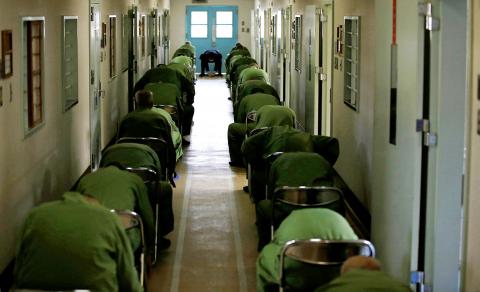A gaunt, 92-year-old man in a wheelchair sunbathes in a narrow courtyard, motionless, his eyes closed. Nearby, a few dozen other older men with short gray hair exercise slowly as an instructor gently calls out: “Don’t strain yourselves.”
The man in the wheelchair is not in a nursing home.
He is in prison, serving a life sentence for murder and rape. The others nearby are serving time for serious crimes, too, including murder.

Photo: Reuters
Their prison in Tokushima, 520km west of Tokyo, converted a building to house older inmates, putting itself at the forefront of an effort to cope with Japan’s graying prisoner population.
The number of prisoners aged 60 or older has risen 7 percent from a decade ago to 9,308, and made up 19 percent of the entire prison population in Japan in 2016. That compares with only 6 percent of that age bracket in the US and about 11 percent in South Korea.
A sizable chunk of older inmates are repeat offenders, which experts have said reflects the difficulties of finding jobs after release and coping with the uncertainty freedom brings.
“I have a heart condition and used to collapse often at the [prison] factory,” said an 81-year-old inmate at Tokushima, imprisoned for life for killing a taxi driver and injuring another person six decades ago.
Prison rules forbid publishing his name.
He and about two dozen other prisoners live, eat and work in the special building set aside for older prisoners who cannot do regular work, such as making shoes and underwear.
In a rare look inside a Japanese prison, Reuters visited the Tokushima facility and interviewed inmates who spend most of their days in large cells that sleep four or five, engaged in paper-folding projects and other light tasks.
Workers chop up noodles and other foods for those who have difficulty chewing and swallowing. The prison also employs a caregiver trained in working with older people for those in its hospital ward, including the 92-year-old man serving a life sentence.
Despite his life sentence, the 81-year-old has been released twice on parole, but wound up back in prison after being caught drinking alcohol, a parole violation.
He hopes to be paroled again so he can see his 103-year-old mother.
“I want to get out of the prison while she’s still alive,” he said. “That’s all I want.”
The Japanese Ministry of Justice said it did not have information on what changes prisons have made to adapt to older prisoners, as such decisions are up to each facility.
Calls to 13 of Japan’s major prisons showed that none of the others has a separate facility where older prisoners are allowed to sleep and work in their cells, instead of marching every morning to a prison factory.
However, many have taken steps.
For example, when the prison in western Takamatsu built a new three-story building in 2010, it set aside the first floor for older prisoners. There is no difference in the floor level between cells and hallways to assist inmates with impaired mobility.
The Tokushima prison tries to ensure that aging prisoners stay healthy without making conditions too comfortable, treatment director Kenji Yamaguchi said.
Talking is forbidden during work hours, cells have no air-conditioning and prisoners can only bathe twice per week in winter and three times per week in summer.
“As they await their eventual release, we also want to see them leave in good health,” Yamaguchi said. “Some may think we are cutting them too much slack, but their freedom is still restricted considerably. It’s not exactly a comfortable life.”
However, returning to life “on the outside” can be tough for older men.
About one-quarter of inmates 65 and older end up back in prison within two years, the highest of any age group, government data tracking those released in 2015 showed.
“If you are young, you can find a job and have a chance to lead a normal life,” Tokyo Future University professor Yasuyuki Deguchi said. “The lack of employment opportunities, combined with labeling as an ex-convict, makes reintegration difficult for the elderly.”
Of those jailed in 2016, 36 percent of those older than 60 were in prison for at least the sixth time, far greater than the 16 percent for all prisoners incarcerated that year.
The next biggest group was first-time offenders, who accounted for 29 percent of prisoners 60 and older.
Police data in South Korea showed that about 15 percent of those aged 65 or older who committed a crime in 2016 had been convicted at least five times already.
A 71-year-old former prisoner who was in jail seven times for theft and fraud said a lack of jobs and shelter drove him to back to crime.
“There are few jobs once you’ve passed 65. As long as you’ve got a job and a place to live in, you can get by. Without them, you turn to shoplifting and stealing just to put food in your mouth,” he said.
“I personally know people who willingly go back to prison,” said the man, who is staying at a halfway house in Tokyo after being released from prison in October last year. “As long as you are in prison, you get meals and a room.”
Seven-and-a-half years through a 13-year sentence for murder, a man in his early 70s in the Tokushima prison said he was already bracing for the day he gets out.
“To be honest, I feel nothing but anxiety,” he said. “I have misgivings and concerns that it’s going to be a difficult adaptation to the outside world. I don’t even know anything about smartphones.”
“I must try not to think that I could be better off staying here,” he added.

‘HYANGDO’: A South Korean lawmaker said there was no credible evidence to support rumors that Kim Jong-un has a son with a disability or who is studying abroad South Korea’s spy agency yesterday said that North Korean leader Kim Jong-un’s daughter, Kim Ju-ae, who last week accompanied him on a high-profile visit to Beijing, is understood to be his recognized successor. The teenager drew global attention when she made her first official overseas trip with her father, as he met with Chinese President Xi Jinping (習近平) and Russian President Vladimir Putin. Analysts have long seen her as Kim’s likely successor, although some have suggested she has an older brother who is being secretly groomed as the next leader. The South Korean National Intelligence Service (NIS) “assesses that she [Kim Ju-ae]

In the week before his fatal shooting, right-wing US political activist Charlie Kirk cheered the boom of conservative young men in South Korea and warned about a “globalist menace” in Tokyo on his first speaking tour of Asia. Kirk, 31, who helped amplify US President Donald Trump’s agenda to young voters with often inflammatory rhetoric focused on issues such as gender and immigration, was shot in the neck on Wednesday at a speaking event at a Utah university. In Seoul on Friday last week, he spoke about how he “brought Trump to victory,” while addressing Build Up Korea 2025, a conservative conference

DEADLOCK: Putin has vowed to continue fighting unless Ukraine cedes more land, while talks have been paused with no immediate results expected, the Kremlin said Russia on Friday said that peace talks with Kyiv were on “pause” as Ukrainian President Volodymyr Zelenskiy warned that Russian President Vladimir Putin still wanted to capture the whole of Ukraine. Meanwhile, US President Donald Trump said that he was running out of patience with Putin, and the NATO alliance said it would bolster its eastern front after Russian drones were shot down in Polish airspace this week. The latest blow to faltering diplomacy came as Russia’s army staged major military drills with its key ally Belarus. Despite Trump forcing the warring sides to hold direct talks and hosting Putin in Alaska, there

North Korea has executed people for watching or distributing foreign television shows, including popular South Korean dramas, as part of an intensifying crackdown on personal freedoms, a UN human rights report said on Friday. Surveillance has grown more pervasive since 2014 with the help of new technologies, while punishments have become harsher — including the introduction of the death penalty for offences such as sharing foreign TV dramas, the report said. The curbs make North Korea the most restrictive country in the world, said the 14-page UN report, which was based on interviews with more than 300 witnesses and victims who had